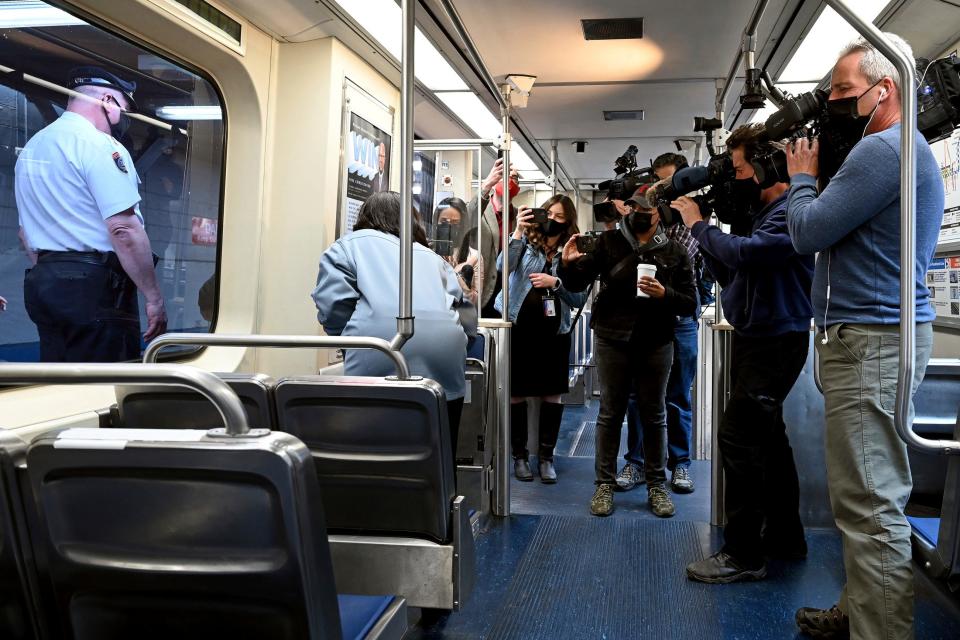District attorney: 'Not true' that bystanders in Philadelphia train rape case sat by and shot video

When news first came out that a woman had been raped on a busy train in Philadelphia last week, it drew nationwide attention and outrage because police said bystanders did nothing to intervene. Police even went so far as to say that some citizens filmed the attack.
Now, the district attorney on the case is refuting that characterization.
At a press conference Thursday, Delaware County District Attorney Jack Stollsteimer said it's not true that people sat on the train and "watched this transpire and took videos of it for their own gratification."
Stollsteimer said witnesses who were on the Southeastern Pennsylvania Transportation Authority should come forward to share information about what they saw. He also stressed that it is not against the law in Pennsylvania to witness a crime and not intervene. Anyone who saw the attack would not be prosecuted, Stollsteimer emphasized.
Analysis: Rape on Philadelphia train was horrific, but experts say we're missing something in our outrage
The district attorney painted a picture, instead, of a "sparsely" crowded train, with passengers getting on and off throughout the interaction between the suspect and victim and eventual rape. He said people getting on and off the train might not have known what was going on at any given point and that they were witnessing a rape in progress.
He acknowledged there were two people who were believed to have filmed at least part of the incident, and he is in possession of one witness's video. Stollsteimer also said CCTV footage from SEPTA shows the whole attack and will be convincing in the prosecution of the case.
The suspect, Fiston Ngoy, 35, allegedly harassed the woman, groped her and eventually raped her through more than two dozen train stops last week, authorities said. SEPTA authorities also said at a press conference earlier this week that officers responded within three minutes of the lone 911 call they received – from an off-duty transportation employee.
Police said they believed no one called authorities, and they were investigating whether any of the witnesses may have recorded the incident. Authorities said they were disturbed by the lack of intervention, claiming people had watched the assault happen.
"There were people witnessing the act with phones in their hands," SEPTA Police Chief Thomas J. Nestel said at the press conference held Monday. "People were holding their phone up in the direction of this woman being attacked."
"There was a lot of people, in my opinion, that should have intervened. Somebody should have done something," Superintendent Timothy Bernhardt, of the Upper Darby Police Department, told The Philadelphia Inquirer. "It speaks to where we are in society and who would allow something like that to take place. So it’s troubling."
Bernhardt stood alongside Stollsteimer as the top prosecutor contradicted the narrative that witnesses "callously recorded" the crime.
"People in this region are not, in my experience, so inhuman and callous human beings that they're going to sit there and just watch this happen and videotape it, as one journalist said today, 'for their own private enjoyment,'" Stollsteimer said.
He said people are more like a woman who, in a separate Wednesday night incident involving a sexual assault at a SEPTA stop, intervened to help the victim when she cried out for help.
"When people need help, people stand up and help," he said.
Some have drawn comparisons in the police and media's initial reaction to the famous 1964 murder of Catherine "Kitty" Genovese. Genovese, a 28-year-old bartender, was stabbed to death outside her New York City apartment.
The New York Times published a story, based on early police accounts, claiming that 38 people witnessed the attack and did nothing, prompting research into the "bystander effect." The case has been featured in psychology textbooks for decades.
However, later reporting revealed the number was likely exaggerated, and there was evidence that some people had called the police or tried to help.
Such may be the case on the Philadelphia train. Stollsteimer didn't reveal the number of people who were on the train and may have witnessed some or all of the attack. He maintained Thursday that his priority is in assuring witnesses that they will not be prosecuted and encouraging them to come forward to share their accounts.
SEPTA denied a request from USA TODAY to view the surveillance footage of the Oct. 13 attack "due to the ongoing criminal investigation."
This article originally appeared on USA TODAY: DA in Philadelphia train rape case: Witnesses didn't 'callously' film

 Yahoo Movies
Yahoo Movies 